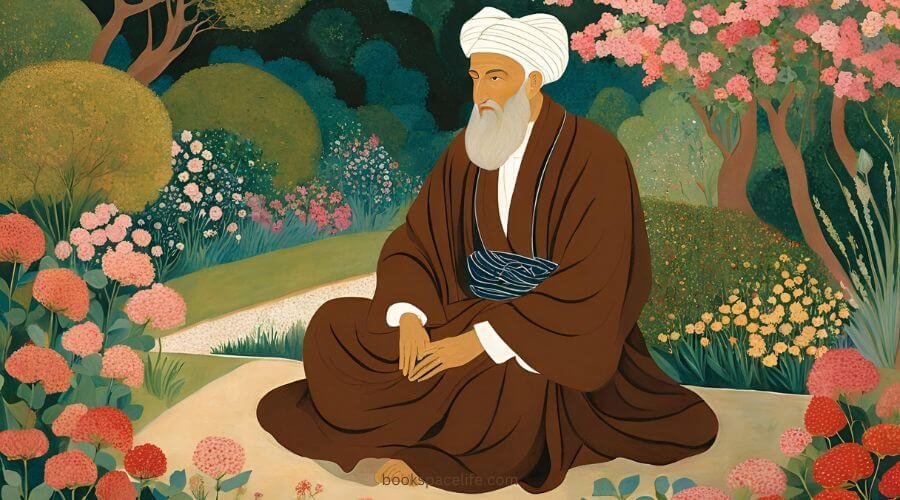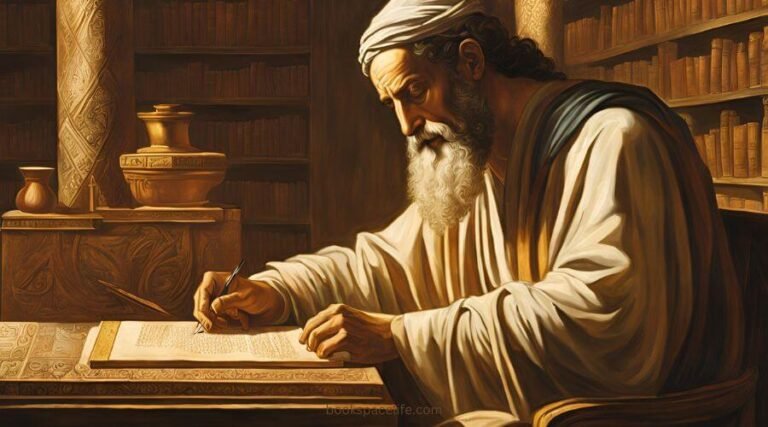Philo of Alexandria
Table of Contents
Jalal ad-Din Rumi: The Philosopher of Love and the Mystical Path
Jalal ad-Din Muhammad Rumi (1207–1273 CE) is one of the most influential figures in Islamic mysticism, known not only for his poetic genius but also for his profound philosophical ideas.
A towering figure in the Sufi tradition, Rumi’s works on spirituality, love, and the nature of existence continue to captivate readers around the world, transcending religious and cultural boundaries.
His ideas have inspired a wide range of thinkers, poets, and spiritual seekers for centuries.
This blog post delves into Rumi’s early life, his educational and spiritual journey, the core of his philosophy, and his lasting influence on both Eastern and Western thought.

(1) Early Life and Education
Rumi was born on September 30, 1207, in the city of Balkh, located in present-day Afghanistan.
He was born into a family of religious scholars; his father, Baha’ al-Din Walad, was a renowned scholar and mystic, and his mother, Mumina Khatun, came from a noble family.
Rumi’s early education reflected his religious and intellectual heritage. He received traditional Islamic education, learning from his father and various teachers, including studies in theology, law, and linguistics.
In the early 13th century, due to political instability in the region caused by the Mongol invasions, Rumi’s family was forced to flee their homeland.
They traveled through Persia (modern-day Iran), eventually settling in the city of Konya (in present-day Turkey), which was a thriving center of Seljuk culture.
It was in Konya that Rumi would come into his own as both a spiritual leader and a poet.
Rumi’s education in Islamic jurisprudence and theology deepened during his years in Konya.
He studied under prominent scholars and teachers, including Shams al-Din Tabrizi, who would later become his spiritual guide and transform Rumi’s intellectual life.
This encounter with Shams is often regarded as a turning point in Rumi’s spiritual and philosophical development, sparking his journey toward mystical enlightenment.
‘(i) The Turning Point: The Encounter with Shams al-Din Tabrizi
Rumi’s early work reflected traditional Islamic scholarship, but it was his meeting with Shams al-Din Tabrizi, a wandering dervish and spiritual mentor, that fundamentally transformed his life and philosophy.
Shams’ unconventional approach to Sufism and his direct challenge to Rumi’s more intellectual approach to religion inspired Rumi to abandon the constraints of formal scholarship and embrace the experiential, ecstatic, and mystical aspects of spirituality.
Shams’ teachings focused on the direct experience of God, emphasizing a relationship with the Divine that transcended formal religious rituals and intellectual reasoning.
For Rumi, Shams embodied the Divine Beloved—a figure of infinite love and grace that could only be understood through direct experience, rather than through logic or theological arguments.
The bond between Rumi and Shams was deeply transformative.
It sparked in Rumi a deep spiritual awakening and led him to express his mystical insights through poetry, which would become his most enduring legacy.
Rumi’s writings after meeting Shams reflect a profound shift in his approach to spirituality.
Whereas he had previously been more focused on traditional Islamic teachings, he now began to write about the nature of divine love, the search for unity, and the journey toward self-realization.
The relationship between Rumi and Shams was intense, and after Shams mysteriously disappeared, Rumi’s grief led him to pour even more of his soul into his poetry, which became a means of expressing both his inner turmoil and his ecstatic love for God.
(2) Philosophy of Love, Unity, and the Divine
Rumi’s philosophy is deeply rooted in Sufism, which emphasizes the pursuit of direct communion with God through love, devotion, and inner transformation.
His poetic works, particularly the Divan-e-Shams-e-Tabrizi and the Masnavi (also known as the Spiritual Couplets), are filled with rich metaphors, allegories, and stories that explore themes of love, spiritual enlightenment, and the search for truth.
One of the central themes in Rumi’s philosophy is love, which he sees as the force that transcends all boundaries.
For Rumi, love is not just an emotion but the very essence of existence. He famously wrote, “Love is the soul’s light, the taste of eternity.”
In Rumi’s worldview, love is the binding force that unites all things, and it is through love that the individual soul can experience communion with the Divine.
This idea of divine love as the fundamental force of the universe places Rumi in alignment with other great mystics and thinkers who view love as a transcendent power that shapes the cosmos.
Rumi also speaks of the importance of unity. In his philosophy, the ultimate goal of the soul is to return to the Source—God. This journey is marked by a process of self-purification and spiritual growth.
Rumi’s idea of unity with the Divine is expressed in his famous line, “You are not a drop in the ocean.
You are the entire ocean in a drop.” This illustrates the idea that the Divine is not separate from the individual soul but is present within it.
The soul’s true nature is divine, and by transcending the ego and worldly distractions, a person can come to realize their essential oneness with God.
Furthermore, Rumi emphasizes the idea of self-annihilation (known as fana in Sufism) as part of the spiritual path.
In order to attain unity with God, one must surrender their personal identity, ego, and attachments, ultimately dissolving the barriers between the self and the Divine.
Rumi writes, “Don’t grieve. Anything you lose comes round in new form,” conveying the concept that through surrender, the soul can attain a higher form of existence.
(3) Influence and Impact
Rumi’s impact, both during his lifetime and after his death, is immeasurable.
His influence spread far beyond the Sufi tradition and has shaped a wide array of spiritual, philosophical, and literary traditions across the globe.
(i) Influence on Sufism
Rumi’s writings and teachings became central to Sufism, particularly in the Mevlevi Order (known as the Whirling Dervishes), a mystical Sufi order that he founded after his death.
His emphasis on love, the longing for God, and the practice of spiritual ecstasy through music and dance became hallmarks of the Mevlevi tradition.
The whirling dance performed by the dervishes symbolizes the soul’s journey towards God and the annihilation of the self in the divine presence.
Rumi’s poetry continues to be a foundational text in Sufi spiritual practice, offering wisdom, inspiration, and guidance to practitioners seeking to cultivate a deeper connection with the Divine.
(ii) Impact on Western Thought
Although Rumi’s work was largely confined to the Islamic world for centuries, his ideas began to gain significant traction in the West in the 19th and 20th centuries.
His poetry was translated into many languages, including English, and became a touchstone for thinkers interested in mysticism, spirituality, and the philosophy of love.
Figures like Thomas Merton and Carl Jung found deep resonance with Rumi’s ideas, particularly his emphasis on the transcendence of the self and the importance of direct mystical experience.
Today, Rumi is widely regarded as one of the most read and loved poets in the world.
His works are frequently quoted and studied not only for their spiritual and philosophical depth but also for their universal appeal.
Rumi’s focus on love, unity, and self-transformation resonates across cultural and religious lines, making him a figure of global significance.
(4) Legacy
Rumi’s legacy is vast and multifaceted. As a poet, philosopher, and mystic, he transcended the boundaries of time, geography, and religion.
His teachings on the power of love, the unity of all beings, and the journey of self-discovery continue to inspire people around the world.
His poetry, filled with vivid imagery and timeless wisdom, has made him one of the most beloved spiritual figures in history.
Through his work, Rumi left behind a powerful message: that love is the central force of the universe, and the path to the Divine is found through surrender, selflessness, and spiritual awakening.
His life and teachings are a testament to the power of mystical experience, and his influence continues to shape the spiritual landscape of the modern world.Top of Form







